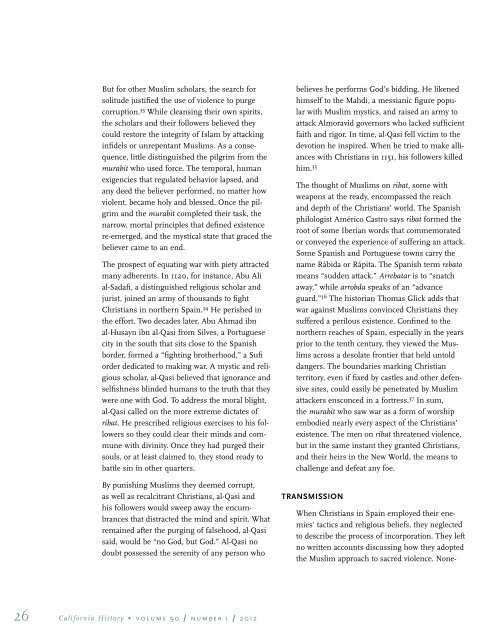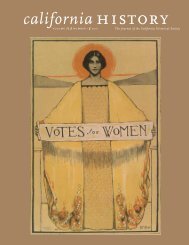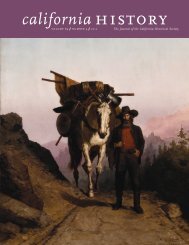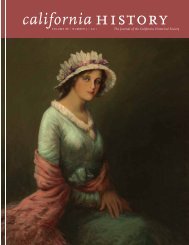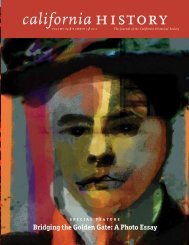Volume 90, Number 1 - California Historical Society
Volume 90, Number 1 - California Historical Society
Volume 90, Number 1 - California Historical Society
Create successful ePaper yourself
Turn your PDF publications into a flip-book with our unique Google optimized e-Paper software.
26<br />
But for other Muslim scholars, the search for<br />
solitude justified the use of violence to purge<br />
corruption. 33 While cleansing their own spirits,<br />
the scholars and their followers believed they<br />
could restore the integrity of Islam by attacking<br />
infidels or unrepentant Muslims. As a consequence,<br />
little distinguished the pilgrim from the<br />
murabit who used force. The temporal, human<br />
exigencies that regulated behavior lapsed, and<br />
any deed the believer performed, no matter how<br />
violent, became holy and blessed. Once the pilgrim<br />
and the murabit completed their task, the<br />
narrow, mortal principles that defined existence<br />
re-emerged, and the mystical state that graced the<br />
believer came to an end.<br />
The prospect of equating war with piety attracted<br />
many adherents. In 1120, for instance, Abu Ali<br />
al-Sadafi, a distinguished religious scholar and<br />
jurist, joined an army of thousands to fight<br />
Christians in northern Spain. 34 He perished in<br />
the effort. Two decades later, Abu Ahmad ibn<br />
al-Husayn ibn al-Qasi from Silves, a Portuguese<br />
city in the south that sits close to the Spanish<br />
border, formed a “fighting brotherhood,” a Sufi<br />
order dedicated to making war. A mystic and religious<br />
scholar, al-Qasi believed that ignorance and<br />
selfishness blinded humans to the truth that they<br />
were one with God. To address the moral blight,<br />
al-Qasi called on the more extreme dictates of<br />
ribat. He prescribed religious exercises to his followers<br />
so they could clear their minds and commune<br />
with divinity. Once they had purged their<br />
souls, or at least claimed to, they stood ready to<br />
battle sin in other quarters.<br />
By punishing Muslims they deemed corrupt,<br />
as well as recalcitrant Christians, al-Qasi and<br />
his followers would sweep away the encumbrances<br />
that distracted the mind and spirit. What<br />
remained after the purging of falsehood, al-Qasi<br />
said, would be “no God, but God.” Al-Qasi no<br />
doubt possessed the serenity of any person who<br />
<strong>California</strong> History • volume <strong>90</strong> number 1 2012<br />
believes he performs God’s bidding. He likened<br />
himself to the Mahdi, a messianic figure popular<br />
with Muslim mystics, and raised an army to<br />
attack Almoravid governors who lacked sufficient<br />
faith and rigor. In time, al-Qasi fell victim to the<br />
devotion he inspired. When he tried to make alliances<br />
with Christians in 1151, his followers killed<br />
him. 35<br />
The thought of Muslims on ribat, some with<br />
weapons at the ready, encompassed the reach<br />
and depth of the Christians’ world. The Spanish<br />
philologist Américo Castro says ribat formed the<br />
root of some Iberian words that commemorated<br />
or conveyed the experience of suffering an attack.<br />
Some Spanish and Portuguese towns carry the<br />
name Rábida or Rápita. The Spanish term rebato<br />
means “sudden attack.” Arrebatar is to “snatch<br />
away,” while arrobda speaks of an “advance<br />
guard.” 36 The historian Thomas Glick adds that<br />
war against Muslims convinced Christians they<br />
suffered a perilous existence. Confined to the<br />
northern reaches of Spain, especially in the years<br />
prior to the tenth century, they viewed the Muslims<br />
across a desolate frontier that held untold<br />
dangers. The boundaries marking Christian<br />
territory, even if fixed by castles and other defensive<br />
sites, could easily be penetrated by Muslim<br />
attackers ensconced in a fortress. 37 In sum,<br />
the murabit who saw war as a form of worship<br />
embodied nearly every aspect of the Christians’<br />
existence. The men on ribat threatened violence,<br />
but in the same instant they granted Christians,<br />
and their heirs in the New World, the means to<br />
challenge and defeat any foe.<br />
tranSMiSSion<br />
When Christians in Spain employed their enemies’<br />
tactics and religious beliefs, they neglected<br />
to describe the process of incorporation. They left<br />
no written accounts discussing how they adopted<br />
the Muslim approach to sacred violence. None-


